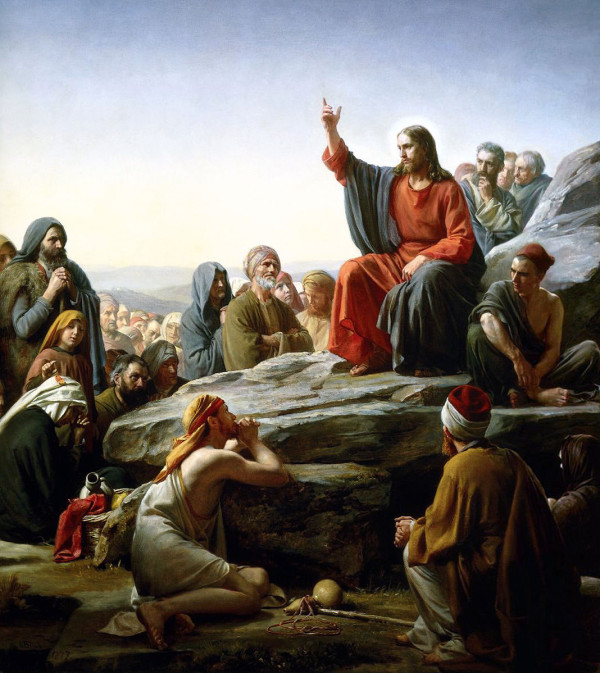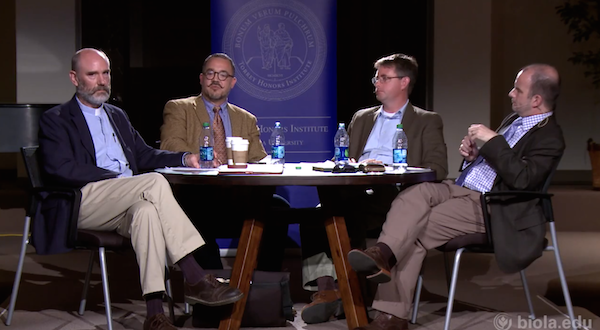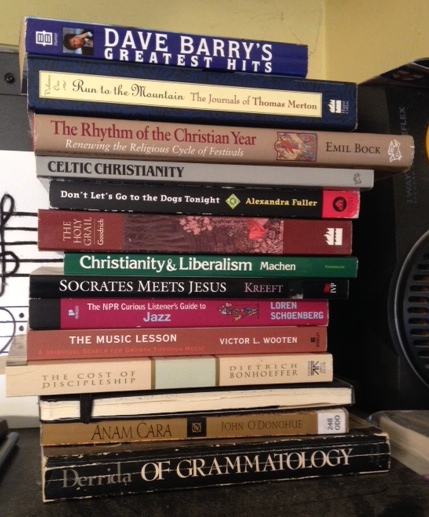The is the first part of a basic nuts-and-bolts meta-sermon of sorts I gave on 5/4/2014. Here I look at the biblical precedent for some guy standing up in front of the congregation and talking for an hour. Alright, that’s probably a bit harsh! It’s not so bad. I also trace some of the history of how the pulpit supplanted the table during the Reformation and how audience and time context shapes presentation.
Prayer:
Father God, teach us your Word. Lord, compel us to not dismiss one page of it. We thank you for making your Word incarnate, for sending your son Jesus Christ to be not ink on a page but to singlehandedly fulfill every single letter and phrase of it on our behalf. Teach us to love your law, to heed your commandments, and to understand the kindness of your work on earth. But much more than that, I pray you release our grip that we may rest peacefully in the work of Christ. Amen.
Alright, today’s message is going to be a bit unusual. Rather than a proper Sermon like you might hear every week here, I’m going to be delivering a meta-sermon. That is, I’m going to preach about preaching. It’s like those plays like Hamlet that have the characters putting on their own play as part of the story. Or maybe like some clever movies where the 4th wall is broken and the scene zooms out to reveal the camera man and another guy close by with a boom microphone.
I want to talk about something that many of us here have experienced quite literally over a thousand times – maybe even two thousand times – sitting and listening to a sermon in church. Why do we do that? Have we had enough of that already? Are you still eager to hear the next one? If you’ve had kids, you probably remember the day they asked you where babies come from, but have you ever thought about where sermon’s come from?
I’m going to talk about that today, looking at the biblical precedent for preaching from the word, how it’s been practiced and adapted throughout history, and why we here at Bridge Bible Fellowship preach from the bible in a particular way. Finally, I’ll be giving you some background as to why for the next month or two, you’ll be hearing us preach through one of the lesser-known books of this minor prophets.
So what are we all doing here anyway? We’ve taken a couple hours out of our week to all get together here to worship our God, the one and only true and holy God whom we believe created everything there is and actually cares deeply about each of us human beings. We pray to him, we sing songs to him expressing how great and good he is. And then… we sit down and listen to some guy get up and yack for 45 minutes. What’s up with that? Sometimes what the guy has to say is really interesting or helpful and sometimes not. Why are we doing this? Did someone just make that up or are there good reasons for it? Why don’t we all just have coffee and pray together, or why not just mostly sing the whole time? We all have bibles at home now and lots of great books to read. Couldn’t we just learn the same stuff that way more conveniently?
Well, first off I’d like to start the way we usually start every sermon – with scripture. There is actually a great precedent for reading scripture out loud in public gatherings, as well as explaining and teaching about it. This is something that God has had his people do for thousands of years and we are following suit.
Exodus 24:12:
Then the LORD said to Moses, “Come up to Me on the mountain and be there; and I will give you tablets of stone, and the law and commandments which I have written, that you may teach them.”
God gives the law to Moses on stone tablets and he’s supposed to do what with them? Teach them to the people.
Deuteronomy 6:4-9
Hear, O Israel: The Lord our God, the Lord is one! You shall love the Lord your God with all your heart, with all your soul, and with all your strength. And these words which I command you today shall be in your heart. You shall teach them diligently to your children, and shall talk of them when you sit in your house, when you walk by the way, when you lie down, and when you rise up. You shall bind them as a sign on your hand, and they shall be as frontlets between your eyes. You shall write them on the doorposts of your house and on your gates.
Here, God commands us to diligently teach the scriptures to our children, and talk about them day in and day out, in our house and when were out and about. You think that would also include a worship gathering too? You bet. In that case, we’d probably have one of the other people that know the scriptures better than the average person do the talking. Makes sense.
Deuteronomy 31:9-14
So Moses wrote this law and delivered it to the priests, the sons of Levi, who bore the ark of the covenant of the Lord, and to all the elders of Israel. And Moses commanded them, saying: “At the end of every seven years, at the appointed time in the year of release, at the Feast of Tabernacles, when all Israel comes to appear before the Lord your God in the place which He chooses, you shall read this law before all Israel in their hearing. Gather the people together, men and women and little ones, and the stranger who is within your gates, that they may hear and that they may learn to fear the Lord your God and carefully observe all the words of this law, and that their children, who have not known it, may hear and learn to fear the Lord your God as long as you live in the land which you cross the Jordan to possess.”
Alright so here was instructions to, at the very least, every 7 years read ALL of scripture to the people out loud and “explain” it that they may carefully observe it. It’s on a sort of schedule and you make sure not to skip any of it. This is what God had Moses tell the priests to do anyway.
Nehemiah 8:8
They read from the Book of the Law of God, making it clear and giving the meaning so that the people understood what was being read.
So here, Ezra the priest reads the law to the people and explains it to them as he goes. A lot of scholars think that he is quite possibly TRANSLATING as he goes, since by this time, most of the people living in Israel would be speaking Aramaic instead of old Hebrew.
So that’s an old testament precedent for preaching. What about the new testament? Well, there is even more there. In the gospels, Jesus travels around for 3 years preaching and teaching. Now a lot of people have painted pictures of Jesus teaching and they often look something like this:
He’s outside, usually sitting on a hillside, surround by people that have been following him around. This painting by Carl Bloch shows Jesus giving the Sermon on the Mount (from Matthew). This is how Jesus taught some of the time, but the gospel accounts tell us that he did a lot of his teaching in the local synagogues. The synagogue was their equivalent of a local church. People met there weekly for worship, prayer, and teaching and only travelled to Jerusalem once or twice a year to make sacrifices at the temple. We see this all over the new testament.
Matthew 4:23
Jesus went throughout Galilee, teaching in their synagogues, proclaiming the good news of the kingdom, and healing every disease and sickness among the people.
Luke 4:14-21
Jesus returned to Galilee in the power of the Spirit, and news about him spread through the whole countryside. He was teaching in their synagogues, and everyone praised him.
He went to Nazareth, where he had been brought up, and on the Sabbath day he went into the synagogue, as was his custom. He stood up to read, 17 and the scroll of the prophet Isaiah was handed to him. Unrolling it, he found the place where it is written:
“The Spirit of the Lord is on me,
because he has anointed me
to proclaim good news to the poor.
He has sent me to proclaim freedom for the prisoners
and recovery of sight for the blind,
to set the oppressed free,
to proclaim the year of the Lord’s favor.”Then he rolled up the scroll, gave it back to the attendant and sat down. The eyes of everyone in the synagogue were fastened on him. He began by saying to them, “Today this scripture is fulfilled in your hearing.”
So here is Jesus, teaching from the scriptures, in the local synagogue, to a public audience. He’s giving sermons, using scripture as a basis to talk about all kinds of things. In these verses, Jesus seems to be quite popular. Remember this is in the early part of his ministry, before the people turn against him.
After Jesus is killed and this rises from the grave, the apostles are compelled to tell people all about Him and spread Christianity throughout the world. How do they go about this? Well, we’re told they started out right away preaching in the synagogues again.
Why did they do this? Well, nearly all the first Christians were Jews. It only spread to Greece and Rome and the rest of the world a few decades later, especially after the apostle Paul got in on the act. So the people the apostles first wanted to tell were other Jews who were already going to church (synagogue) regularly. So they continued to teach from the scriptures just as before, but this time they put a new spin on it, connecting Jesus to many of the old prophecies and explaining how his death was the final sacrifice, reconciling us to God forever.
Acts 17:2-3
As was his custom, Paul went into the synagogue, and on three Sabbath days he reasoned with them from the Scriptures, explaining and proving that the Messiah had to suffer and rise from the dead.
Lets not forget Acts 20:7-12 though:
On the first day of the week we came together to break bread. Paul spoke to the people and, because he intended to leave the next day, kept on talking until midnight. There were many lamps in the upstairs room where we were meeting. Seated in a window was a young man named Eutychus, who was sinking into a deep sleep as Paul talked on and on. When he was sound asleep, he fell to the ground from the third story and was picked up dead. Paul went down, threw himself on the young man and put his arms around him. “Don’t be alarmed,” he said. “He’s alive!” Then he went upstairs again and broke bread and ate. After talking until daylight, he left. The people took the young man home alive and were greatly comforted.
So if you are ever sitting through a really boring sermon and having trouble staying awake, take heart! You are not alone. Here is a genuine biblical precedent for snore sermons. Even the great apostle Paul could apparently be kind of a drag sometimes. Maybe that also means that you could cut us some slack on a bad day too. At least you didn’t fall out the window and die, right?
Anyway, all this preaching from scripture continued as the church developed in the first century and on. Beyond the bible, the early history we have shows that Christians gathered to celebrate the Eucharist with bread and wine together, as well as sing, read the scriptures and listen to teaching. Over time, the four gospel accounts became part of the writings that were regularly read and taught about, as well as the letters from Paul and the other disciples that were copied and passed on from town to town. Eventually this formally became the New Testament we have today.
Past this, we have many records of great preachers and bible teachers through the centuries. Saint John Chrysostom was given his name, which means “golden mouthed” because apparently he was such a good preacher. St. Francis is another one whose preaching astounded people and opened their eyes to new angles on Jesus’s teachings.
Things really changed with the Protestant Reformation in the 1500s. We here at Bridge can trace much of roots back to these people and events – it’s a big part of who we are. The Reformers like Martin Luther, John Calvin, and others were really into preaching. The general feeling was that the scriptures had been neglected and that most priests were lousy bible teachers and their congregations ignorant of the basics of Christianity. The result was that hard-core preaching was moved to front and center of the weekly worship gathering. Before, the altar with the bread and wine was at the center of the room and the lectern or pulpit off to the side. Now they switched places in the room. Sermons became much longer, often an hour where they used to be just 10 minutes. The bar for quality was raised too, leading naturally toward requiring pastors to be more scholarly than in past centuries.
An example of how seriously this was taken can be seen in this quote from Martin Luther:
Even if Christ were given for us and crucified a thousand times, it would all be vain if the Word of God were absent and were not distributed and given to me with the bidding: this is for you, take what is yours.
What he is saying here is that understanding the gospel is really important. You can’t just hear it once and be dandy from then on out. You need to be reminded of it well throughout your life. This is because we are so quick to pile guilt and burdens on ourselves, forgetting that Jesus has done absolutely everything for us already.



